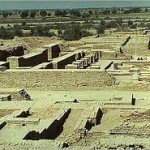Moen-jo-daro
Moen-jo-daro is one of the oldest cities in the world. It is at a distance of 27 kilometers from Larakana on the right bank of the river Indus.4500 year ago, it was a large, busy city. No body knows about it until 1922,when some villagers found pieces of old smooth pots and old bricks at the place, these pieces of old pots were brought to SIR JOHN MARSHAL an English civil servant, he was himself ,very interested in history. so when he looked at them he at once knew that they were piece of very old pots .The men started digging as they dig more and more such pieces came up, till there appeared bit by bit city of straight, roads and well-built houses. Each house as made of large baked bricks and had a bathroom and servant-quarters close by. Covered drains ran beside the streets. Even the streets were of baked bricks. carts and other forms of transport could come right to the center of the town .There is a wide road in the middle of which was the shopping centre with shops on both sides. The country side was fertile since wheat, rice and cotton there were skilled craftsman who worked in gold, silver and ivory. Clay dolls and carts were made for the children to play with. They wore long, loose dresses. Nearby is a MUSEUM, where interesting objects found from moen-jo-daro ,are on exhibition. These include seals jewellery, toys, weapon and painted pottery .the best find is the head of the bull, which was used as a seal. A metal statue of a dancing girl has also been found, there are metal tools too.
LIFE; for a long time these people lived a happy life. They were quite rich and have travelled from place to place for business or pleasure. Their city was well –planned and clean, the rain water did not remain on the streets. We do not know what happened to them later. Either they were raided from the north or some great earth-quake destroyed them. No one has yet been able to determine the meaning of the word written on the seals and on the pottery .much could be learnt if the language experts are able to decipher these words.
By Shamim Bokhari. (204/10)




